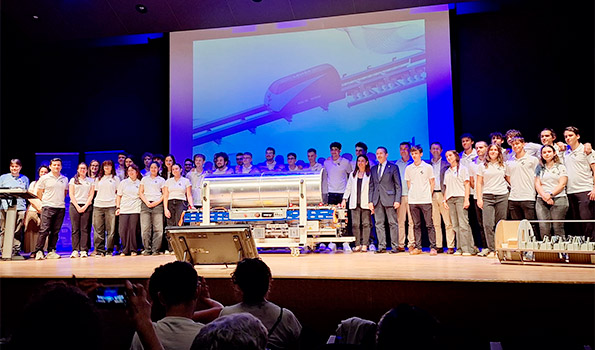Hyperloop UPV team
Levión is the largest prototype in the history of the UPV Design Factory team, driven by passion, perseverance, and commitment to teamwork
[ 26/06/2025 ]
Levión is its name. It is the new prototype from the Hyperloop UPV team. A multidisciplinary team made up of 42 students from 20 different degrees. Every part, every component, has been improved. Levión has grown in length and width. It is half a metre longer than last year and almost a metre wider. This means it is nearly twice the size of the prototype two years ago. Its goal is to participate in the university competition seeking the transport of the future: high-speed ground transport in the form of capsules travelling through tubes.
According to Marcos Pérez, team captain, ‘this year's objectives are the booster, regenerative braking and the chargers’ and, of course, to repeat last year's victory. They were world champions at the European Hyperloop Week in Zurich, where they competed against the world's most prestigious technology universities. 'This year, we are going for it,' he adds. The competition will be held in Groningen (Netherlands) from 14 to 20 July, and the team will travel on 3 July to prepare everything.
The booster is a linear induction motor that runs on the track and produces an initial acceleration of the vehicle of 3 metres in less than 1 second, ‘which would be like going from first to fourth gear in a car,’ explains Pérez.
More sustainable
Another of the team's objectives is to be more environmentally sustainable, so 'we are looking to regenerate energy with each braking action to consume less,' adds the captain of Hyperloop UPV.
Finally, this year, ‘chargers will be implemented so that the batteries can be connected directly to the wall without having to be removed from the vehicle, which provides convenience and energy efficiency,’ adds Marcos Pérez.
The new prototype was unveiled on 20 June at an event presided over by the Rector, José E. Capilla, held in the Alfons Roig Auditorium of the Faculty of Fine Arts - UPV, in front of 300 people. You can watch the video of the presentation at this link.
During the presentation, they explained that more important than resources are ‘passion, perseverance and commitment.’ They also conveyed their experienced commitment to the importance of teamwork: "Hyperloop is a sum of voices, a sum of perspectives, where each person, in each subsystem, functions as a small cog that keeps the whole team running smoothly. If one fails, we all fail, but if we work in harmony, that's when the magic happens, when the eight subsystems of the team combine into one, into a vehicle, an infrastructure, a proposal".
Since 2014
Hyperloop UPV was born in 2014 with the purpose of meeting the challenge launched by Elon Musk through his companies, Tesla and SpaceX, to advance the development of hyperloop technology, thanks to its free hardware feature. The team's tutors are the professors Vicente Dolz, (Department of Thermal Engines and Machines) and Tomás Baviera, (Department of Economics and Social Sciences) from UPV.
The Future Concept (2016) was the prototype launched by this team that is part of Design Factory, the institutional platform of the UPV that promotes and supports the realisation of extracurricular activities, contributing to the formative development and acquisition of transversal competencies of its student body.
Carmen Revillo Rubio/ UPV Communication Area
Outstanding news
 The Diamond Army
The Diamond Army
Two students came up with the UPV initiative that has engaged more than 1,600 volunteers and shattered the false myth of the 'crystal generation'
 ARWU 2024
ARWU 2024
The Shanghai ranking reaffirms the UPV as the best polytechnic in Spain for yet another year
 Distinction of the Generalitat for Scientific Merit
Distinction of the Generalitat for Scientific Merit
Guanter has been distinguished in recognition of his research excellence in the development of satellite methods for environmental applications
 The new statutes come into force
The new statutes come into force
The Universitat Politècnica de València is the first university in Spain with statutes adapted to the new LOSU
 NanoNIR project against breast cancer
NanoNIR project against breast cancer
UPV Researcher Carla Arnau del Valle receives an EU Marie Curie grant to develop biosensors for the early detection of this cancer
 Large artificial intelligence language models, increasingly unreliable
Large artificial intelligence language models, increasingly unreliable
According to a study by the Universitat Politècnica de València, ValgrAI and the University of Cambridge, published in the journal Nature





